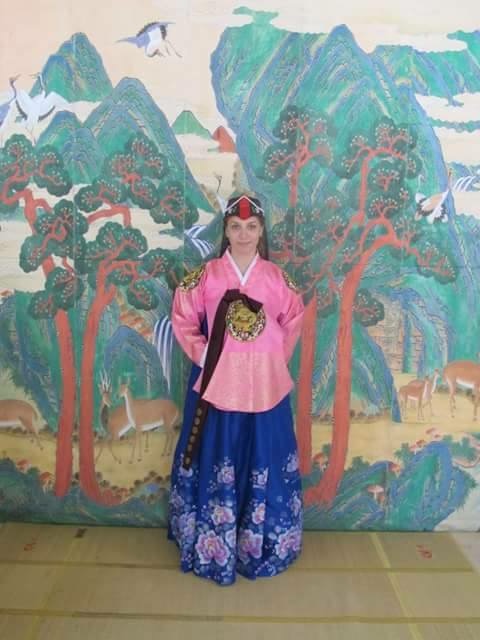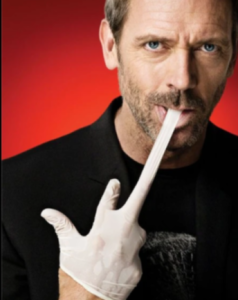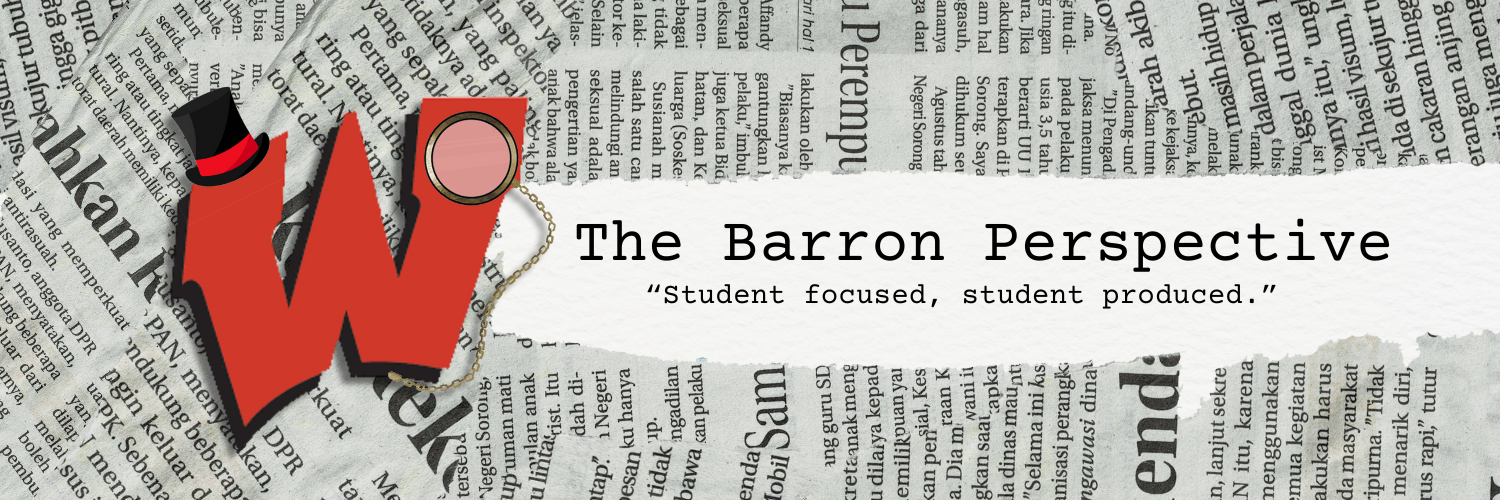By: Katie Forbes

Gina Ball is a Woodbridge High School alumni, who graduated in 2003. After high school, she attended the University of Delaware where she received her bachelor’s degree in Italian Education and discovered her interest in teaching. Since 2011, she has spent a total of three years teaching in Korea. She has taught at a public elementary school, a private middle school and is currently teaching English Conservation at Kangnam University.
Barron Perspective: What did you learn in high school that prepared you for where you are now?
Gina Ball: I learned quickly not to say anything that you don’t want repeated in different circumstances. Gossiping is petty and does no one any good. If you don’t like something, confide in someone you trust to get it off your chest, but don’t harp on it. No one likes Debbie Downer.
BP: Which teachers influenced you at WHS? How?
GB: I will always have a soft place in my heart for Mr. Warren. He was my principal all four years there and I always remember him being incredibly enthusiastic at every pep-rally and sporting event. I remember him being at so many of the games and always booming, “GO BARRONS!” from the bleachers. I appreciate that such much more as an adult: the time commitment he made to his school and his students. I try to be involved with what I can at my school like he was. Mr. Scarano was always very kind to me, and I always remember him with a beaming smile on his face. Ms. Neidhardt’s English class was wonderful. I remember that she wasn’t a teacher out of college, but went back and studied to be one. [It] made me see her more as a person. Ms. Campos’ computer class was also magnificent. She was very laid back and had a fun and teasing rapport with a lot of the students.
BP: What influenced you to go to Korea?
GB: Money, honey! Ha, I’m kidding (but seriously the money is crazy good here). Long story short, I went to Ireland to get my TEFL certificate. One of the girls in my class, and who I befriended, was coming to Korea and told me to look into it. I did, and here I am! Also, English teaching jobs in Korea provide you with housing, which was something important to me, since I didn’t want to deal with doing that on my own, and your employer helps you with every step of your visa process. That’s huge.
BP: What have you learned from your experience in Korea?
GB: I could write a 10,000 word essay on this, but I’ll try to hit the main points. To be fair, I was already 26 and well-travelled when I came here, so I had already learned things from travelling to other countries beforehand, namely: everyone is the same, man. We’re all people. We all laugh at the same jokes, want mostly the same things, have common interests, and love our families and friends. I mean, of course you’re going to get along better with some people than with others. I have less in common with people who share large percentages of my DNA than I do with people who I’ve met abroad. But everyone is just a person; an individual who is not defined by the country on their passport, their religion, their looks, or their accent. Specifically [from] Korea, however, I’ve learned a lot about my view of what it is to be “smart.” You might have heard really good things about the education system here. South Korea regularly ranks amongst the top countries in the world for education (I saw an article a year ago that had it at #2). The government spends a lot of money on education. Parents spend about 25% of their income on their children’s education. Students are in school for something like 12-14 hours a day and even go to school on the weekends. South Korea has the best test takers in the world, but does that mean they’re smart? Students here can memorize anything. At my private academy, my middle schoolers needed take vocabulary tests every two days, and each test had 25 words on it. So, 50 words a week. They usually aced the tests, but couldn’t remember the words (or actually use them, but that’s another story) the next day. Critical thinking is not a priority here, or something that is ever expected to be learned. Student’s don’t have creative writing courses and rarely need to express their opinion about what they’re learning. It really sucks. Everything is just rote memory. Of course, I’m painting with a broad brush, but that is what I’ve gathered here.
Give me someone who asks questions and critically thinks over someone who can memorize things any day of the week. Just because you had high scores on a standardized test, does that mean you’re smart? What are the standardized tests actually assessing? Knowledge or intelligence?
BP: What was your idea of success in high school? How has that changed since?
GB: This is a difficult question, since high school, for me, was like 15 years ago. I can’t pinpoint exactly what I thought success was, but I think I was more concerned with other people than with myself. I wanted to be liked more back then. Now I’m very comfortable and super happy with who I am, flaws and all. I honestly measure success by happiness (which, I’ve come to learn, is a “western” thing): the measure of how happy you are with yourself as a person, your life and the happiness of people around you. I’ve been lucky enough to have an amazing and loving family who, no matter what, supported me making not only making my own decisions, but supported the decisions themselves. I wouldn’t be who I [am] without the ability to live my life and know that whatever befell me, I would have my family there. I think that’s why I’m so adventurous! Sorry, Mom!
BP: Have you reached your idea of success?
GB: People are different and have different personalities, but being happy is something that you need to work for. There are people who are rich, have lots of friends, are beautiful, and have their dream jobs who aren’t happy. It’s something you learn to do and commit to, at least in my case. You know those people who can always find something negative in any situation, or have something to complain about all the time? Yeah, screw that. Practice finding joy in little, everyday things, and the more you do, the easier it will be. This way you don’t need to wait for something to happen to you to be happy, but you manufacture it yourself. Your circumstances should be irrelevant.
BP: What advice do you have for current WHS students?
GB: Travel! Study abroad, take a road trip, go to Paris for your graduation, join the Peace Corps. How can you learn anything about yourself at home? How can you see your home for what it is without some perspective? You need experiences to fully understand yourself, your life, your world and where you come from. And I’m not talking about going to the Dominican Republic to stay in a resort and lay on a beach for four days (though that sounds much better than grading listening tests). I mean, get somewhere and get in there. Go to local restaurants where the menu is not in English and you need to point at the pictures. I went to a Mongolian restaurant where this happened and it was the best tasting thing I’d had in months. Stay in a hostel and meet other travelers. I was in Turkey this summer and shared a room with a web designer from Taiwan, a businessman from Azerbaijan who had just taken a bus for 35 hours, a student from India who’s attending college in Texas, and a guy from Germany who quit his job and was riding his bike from England to Australia. I mean, I didn’t even have to leave the freaking room to expand my horizons! (On a side note, before you travel, do a little research about politics. People from other countries seem to love asking Americans about that stuff.) If you’re staying domestically, go to a bed and breakfast and talk with the owners. Ask them what’s good to see in town. It might be things that you won’t find on Wikipedia. America is huge, and each state has it’s own food and culture. Get out there! Also, take all the classes you can in college, if you choose to attend. If not, watch documentaries about things you’ve never heard of before. Read some nonfiction. Take a free course on Coursera.com. MIT has all of their lectures online for free. Opening your world up starts with education. I went into college being a computer science major. HA! It was only after I was forced to take a language as a requirement that I learned I kind of liked it, and it came easy to me. I never liked Spanish in high school and had no reason to think I would like another language, or that I was even going to be good at it. That one stupid requirement at my university changed my whole life. I studied abroad in Italy, lived with international students and pursued education. You never, ever know what’s going to be that one little thing that will change the course of your future.
I want to add two of the best pieces of advice I have ever heard. I don’t know if they will have a place in [the] article or not.
1. Anything that anyone says or thinks about you, is none of your business. If someone doesn’t like you, it has nothing to do with you, but with them. It’s their preferences that form their opinions. So seriously, like, seriously, don’t care about what other people think.
2. Whenever you disagree with someone about something, be it politics or religion, ask that person what they need to change their mind. If they say, “Nothing! Nothing will change my mind,” you stop talking, and walk away. People who don’t grow or change are not worth the time or effort. They are called ideologues and shouldn’t have a place in your life.
Also, I just want to say a little something about being kind to other people. Being a white, blonde-haired, blue-eyed American, I don’t have too many things going against me in most places, but I have been treated different because of how I look on occasion, and know what it’s like to stand out. I can go out and about for days and not see a person who isn’t Korean. I can’t hide, and I can’t imagine what it would be like to be different and be constantly judged by people because of the way I look or dress. Don’t do that to people. It sucks.

























Mary Natale (White) • Feb 10, 2016 at 6:59 am
Congratulations Gina! Mawbey Proud
Mary Natale (White) • Feb 10, 2016 at 6:59 am
Congratulations Gina! Mawbey Proud
Mary Natale (White) • Feb 10, 2016 at 6:59 am
Congratulations Gina! Mawbey Proud